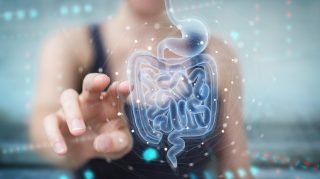Each year, more than 60 million Americans are diagnosed with a digestive disorder. These disorders range from mild stomach upsets such as bloating to life-threatening conditions such as colon cancer. Various conditions can affect the gastrointestinal tract, the liver, the gallbladder, and pancreas.
The good news is that there are simple diet and lifestyle changes you can make to bring balance to your digestive system and ultimately improve your mental and physical well-being.
Below, we will look at the importance of gut health, learn some signs of an unhealthy gut and take you through 13 scientifically proven methods of improving your digestive health.
What Is Gut Health and Why Is it Important?
Organs such as the esophagus, stomach, and intestines all work together to break down food, turn it into nutrients, help the body absorb it, and expel the remaining waste. Most of this work is done by microorganisms that live in the digestive tract. They include trillions of beneficial bacteria, yeasts, fungi, and viruses, all referred to as gut flora.
For a healthy gut, your body needs to maintain the right balance of these microorganisms. When the microbe numbers multiply or decrease beyond natural levels, it causes digestive distress and takes a toll on your entire body. Recent studies show that a healthy gut communicates with the brain through nerves and hormones, helping to maintain general health and well-being.
Luckily, there are various approaches you can take to restore your gut health. For instance, if your body struggles to produce enough enzymes to break down proteins, you can consume foods that contain natural digestive enzymes or check out some of the best proteolytic enzymes in the form of supplements available on the market.

sdecoret/shutterstock
Signs of an Unhealthy Gut
Common symptoms of an unhealthy gut include abdominal pain, diarrhea, gas, constipation, loose stools, bloating, and vomiting. However, there are other warning signs you need to watch out for. They include:
- Stomach Discomfort: Frequent discomfort or noticeable change in bowel habits suggests an imbalance of gut bacteria.
- Constant Fatigue: Studies show that people suffering from chronic fatigue may have a gut microbiome imbalance.
- Difficulty Sleeping: If you struggle to get a good night’s sleep, especially after eating certain foods, it could signal a gut problem.
- Skin irritation: There’s a link between an unhealthy gut and skin disorders such as acne and eczema.
- Food Allergies: An unhealthy gut makes you more susceptible to developing food allergies and sensitivities.
- Mood Swings: Gut microbes are also involved in temperament regulation. An imbalance can increase stress levels as well.
- Frequent Illnesses: Gut microorganisms play an essential role in boosting your immunity. If you have an imbalance, your body may struggle to fight off infections.
- Sugar Cravings: Gut bacteria help regulate your urge to eat. If you have an uncontrollable desire to snack on sugary items, it may be an indication that unhelpful bacteria are behind the cravings.
- Unexplained weight changes: An imbalance in your digestive system can trigger sudden weight gain.
Proven Ways To Improve Digestive Health
Try incorporating these research-backed strategies into your daily life to keep your digestive system functioning optimally.
1. Take Digestive Enzymes
The pancreas naturally produces the bulk of the digestive enzymes necessary to help break down macronutrients in the food we consume, so we can soak up the nutrients. Unfortunately, our bodies don’t always produce enough enzymes, thus slowing down the digestion process and causing discomfort, reflux, indigestion, gas, bloating, and even heartburn.
Low levels are attributed to lifestyle choices or diseases such as cystic fibrosis and chronic pancreatitis. To replenish enzyme levels, consume foods that increase enzyme production, such as papaya or pineapple, or take a digestive enzyme supplement extracted from natural sources such as fruits and vegetables.
2. Increase Your Intake of Omega-3 Fatty Acids
Not all fats are bad for your health. Some beneficial fats, such as omega-3 fatty acids, play a key role in digestion. A recent study suggests that consuming foods that are rich in omega-3 increases the diversity of gut microorganisms, promotes digestion, reduces inflammation, and lowers bad cholesterol.
Since our bodies can’t produce essential fatty acids on their own, we need to source them from food or supplements. Start including fatty fish such as salmon, tuna, and sardines in your diet, and use plant oils such as flaxseed, soybean, and canola oil. Other omega-3 sources include chia seeds, walnuts, navy beans, and avocados.
3. Add Gut-Supporting Nutrients to Your Diet
Beneficial bacteria, known as probiotics, help break down food to a size that can be easily transported into the bloodstream. If your body isn’t producing enough beneficial bacteria due to stress, medication, or an unbalanced diet, you can shore up the numbers by taking natural supplements.
Probiotic supplements can replenish healthy bacteria in your digestive tract, which means your body can easily break down indigestible fibers that usually cause gas and bloating. You’ll enjoy better digestion, increased nutrient absorption, and improved overall well-being.
4. Eat Fermented Foods
If you prefer to nourish the good bacteria in your tummy through diet, there are plenty of options for you. Some probiotic supplements can’t survive in a harsh stomach environment, meaning you may have to look for a more sustainable solution to the problem. And it comes in the form of fermented foods.

casanisa/shutterstock
Fermented foods are natural sources of probiotics, and frequently including them in your meal plans will bring some much-needed balance to your gut. Start loading up your grocery cart with kombucha, Greek yogurt, kefir, kimchi, sourdough bread, and pickles. You can have either of these foods as snacks, or incorporate them into your main meals.
5. Stay Hydrated
Fluids play an essential role in digestion. Most digestive disorders are brought about by a lack of adequate water in the body. Increasing your water intake helps move food through the intestines, breaking it down, and helps facilitate proper absorption.
To avoid constipation, make sure you drink 1.5 to 2 liters of water a day. Your intake should be more than that if you work out intensely or live in a warmer climate. Other sources of water include healthy fluids such as natural fruit juices, smoothies, soups, and water-rich fruits such as watermelon, cucumber, and apples.
6. Manage Stress
Stress affects all areas of the body, including your gut. In the bowel, it causes cramping, discomfort, inflammation, bloating, and loss of appetite. Remember how you get butterflies in your tummy when you are anxious? This happens because your digestive system is controlled by the central nervous system. When you are under pressure, your nervous system triggers the release of a stress hormone to help the body prepare for the threat.
This reaction increases the acid in your stomach, makes you feel nauseous, and causes constipation or diarrhea. If stress isn’t managed, it can lead to ulcers, gastroesophageal reflux, or inflammatory bowel disease. You can manage stress through meditation, yoga, developing time management skills, and setting goals,
7. Sip Peppermint Tea
Peppermint tea has been used for centuries to aid digestion. Although it’s commonly used as a flavoring in foods and a fragrance in cosmetics, this aromatic herb is packed with countless health benefits. One study showed that peppermint helps the digestive system relax and soothe the pain.
The herb also prevents stomach muscles from contracting and relieves spasms. Other studies have shown that it minimizes the frequency, length, and seriousness of abdominal pain. There is reason to believe that drinking tea made from peppermint extract will help you harvest the health benefits of the mint plant.
8. Working Out Regularly
Exercise not only helps you improve your physical and mental well-being but also promotes gut health. First, it helps food to keep moving along the digestive tract and reduces symptoms of gut disorders. A recent study revealed that increasing physical activity promotes bacterial diversity in the gut.
So, if you haven’t been engaging in any meaningful physical activity, it’s time to start moving. Make sure you work out for at least 30 minutes every day. You can walk, jog, run, cycle, or sign up for workout classes at your local gym.
9. Add Ginger to Your Spices
Ginger is valued as an aromatic, tasty addition to recipes. But it’s more than just flavoring. For centuries, it’s been used for medicinal purposes in South Asia. When scientists began to investigate its effect on digestion, they found it had multiple compounds that helped ease gastrointestinal discomfort.
 It has even been noted that ginger works more effectively when compared to popular pharmaceuticals. It’s perfect for preventing gas build-up, inhibiting vomiting, protecting the gastric lining against acidity, and improving overall digestion. Ginger root can be eaten fresh, dried, or as a beverage.
It has even been noted that ginger works more effectively when compared to popular pharmaceuticals. It’s perfect for preventing gas build-up, inhibiting vomiting, protecting the gastric lining against acidity, and improving overall digestion. Ginger root can be eaten fresh, dried, or as a beverage.
10. Don’t Overuse Antibiotics
Antibiotics help ward off bacterial infections. But in the stomach, these drugs sometimes don’t differentiate between beneficial and harmful bacteria. In fact, they have been shown to change the composition of intestinal microbes drastically.
When antibiotics are used excessively, they cause rapid and diminished bacterial diversity levels, leading to intestinal side effects, like diarrhea. Sadly, some of these effects can persist even after you stop the dosage. To minimize damage when taking antibiotics, avoid eating immediately before and after taking the medication unless instructed by your doctor. Also, take probiotics at the same time as antibiotics to replenish good bacteria.
11. Establish Healthy Sleep Habits
Most of us know that a lack of quality sleep causes fatigue, headaches, and irritability. But did you know that poor sleeping habits can have a detrimental effect on your digestive health? First, sleep allows your digestive system to slow down and rest.

wavebreakmedia/shutterstock
Getting enough shut-eye also gives your digestive system a chance to replenish your energy levels that your digestive system will later use to break down food. Sleep deprivation triggers irritable bowel syndrome, heartburn, and other nasty gut disorders. Protect your gut by avoiding big meals before bedtime, not eating three hours before bed, and avoiding caffeinated drinks at night. Ideally, you should try and get at least seven hours of sleep every night.
12. Eat High-Fiber Foods
Soluble fiber makes your stool bulkier and softer, while insoluble fiber helps food move through your digestive tract. All of this prevents constipation and other digestive system issues. Foods that have a high fiber content include whole grains, veggies, apples, citrus fruits, nuts, seeds, beans, and potatoes. Include more fiber to your diet by adding cereal to your breakfast, switching to whole grain bread, rice, pasta, and floor, and eating fresh fruits and nuts as snacks.

13. Ditch Some Bad Habits
Most times, we think bad lifestyle choices only affect our weight-loss goals. But in reality, most of these habits also ruin our gut health. First, processed foods with high sugar, salt, fat, and chemicals cause an imbalance in our guts, and the microorganisms in the digestive system aren’t designed to process high levels of these substances. Other habits that compromise gut health include consuming too much alcohol, cigarette smoking, and drinking sugary sodas.
Take a Multi-Pronged Approach To Transform Your Gut Health
There is no single solution that can improve the health of your digestive system on its own. For better and long-lasting results, combine the different methods mentioned above, and be consistent. Remember, a healthy gut improves your mental wellness, physical well-being, and overall quality of life.
Read more
Want to read more about Digestive Enzymes? Click on this link: Digestive Help



![women [longevity live]](https://longevitylive.com/wp-content/uploads/2020/01/photo-of-women-walking-down-the-street-1116984-100x100.jpg)











Really g advice and info on this .
One comment though – the picture used showing a model who’s ribs and hip bones stick out and legs have enough space for a bus to drive through is not best examople to use for “healthy stomach” ad. Many people with IBS and other gut issues that would be interested in these articles also have possible food related or eating disorders that cause body image issues. This does not help.
Just my opinion as a parent of child with IBS and an ED.
Gabrielle, thanks for taking the time to write to us and to alert us to it. I will check with my team, as there is no such photo on the post, and we are sensitive to these issues. However, it is possible, we may have corrected this already. Gisele